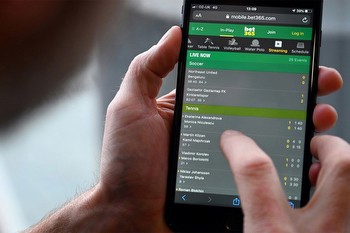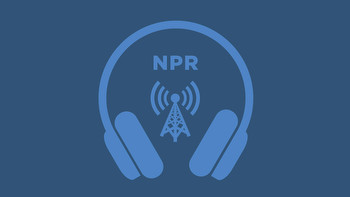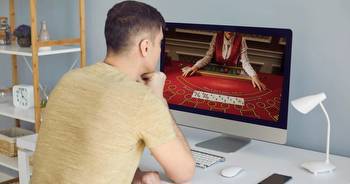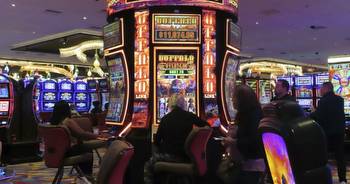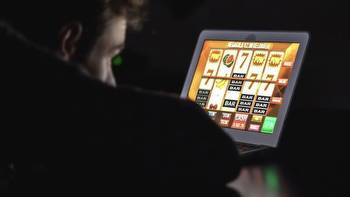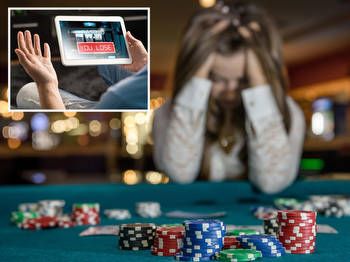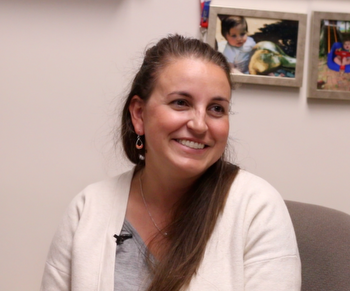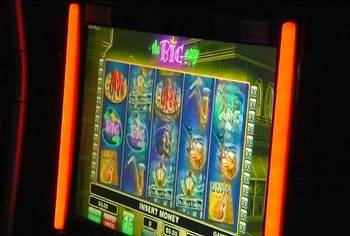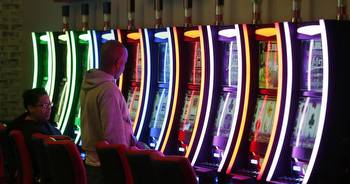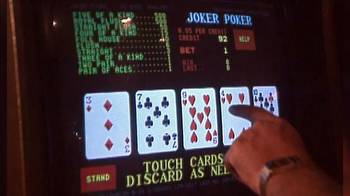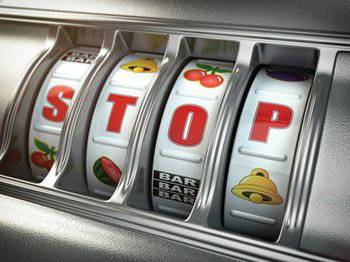Gambling addiction on the rise as access to betting options expands

From casinos to video gaming machines to sports betting apps on cell phones, access to gambling has expanded significantly in recent years.
While that has led to increased tax revenue across Illinois, it's also accompanied by a growing problem: gambling addiction.
Bill Johnson of Bartonville is approaching 50 years in continuous recovery from various addictions.
“When I got sober, back in – we didn't even talk about gambling addiction back in the mid ’70s, late ’70s. It wasn't an issue,” said Johnson. “Would I have qualified? I'm not sure. I'm not sure.
“I know the addictions I have are enough for me; I would not like to have more diagnoses, I don't think. But yeah, I gambled.”
Johnson is the director emeritus of the Illinois Council on Problem Gambling (ICPG), a nonprofit organization he started overseeing in 2011. He says the proliferation of gambling opportunities is increasing the risk of exposure to potentially addictive behavior.
“Where can you go that you don't see video gaming terminals? Well, I don't know,” he said. “Every place I go – when I go out to eat, when I go to the gas station – there's a video gaming terminal. So more people are exposed to it, and more people are developing a problem.
“Historically, what we've seen is the big jump in problem gambling for sports gamers. They’re young adult males, primarily, between the ages of 21 and 35.”
Johnson stresses the ICPG holds a neutral position on gambling.
“It's legal in the state of Illinois; it's entertainment, (and) 97-98% of the people that do it, enjoy it,” he said. “They have money set aside that, you know, ‘I'll spend $200 on this’ and they don't go outside those limits. But there's that 2-3-4% – you can find different numbers on that – it’s big problem for them, their family, their communities.”
Illinois is home to 16 casinos, including the Par-A-Dice riverboat in East Peoria, as well as 13 licensed sports books and more than 8,500 licensed video gaming establishments. The Illinois Gaming Board reports the industry generated $1.5 billion in tax revenue for the state and local communities in 2023.
However, research by Health Resources In Action indicates 4% of Illinois residents have a gambling disorder, and another 7% are at risk of developing one. That's more than 1.1 million people.
“Many of these gamblers gamble to escape a lot of their true feelings and problems,” said Dr. Robert Lizer, the medical director of the Addiction Recovery Center at Carle Health Proctor Hospital in Peoria. “They actually get euphoria from gambling, a pleasure sensation within the brain. It makes them feel better, so just thinking about gambling or even on the way to gamble, many people have less anxiety, depression, and there's some of the concerns that I see.”
Lizer says problem gambling can be just as debilitating as alcoholism or substance addiction.
“People basically give up other forms of pleasure to go gamble, whether spending time with a family or even taking time for work when they should be doing these other things that are very critical to their life,” said Lizer. “They’re spending it on focusing in the gambling cafes, is what they're doing.
“Sometimes it can be as severe as even hygiene; some people don't shower, some people don't take care of themselves, eating. The gambling really takes over that pleasure center and drive it just like other substances.”
Johnson notes that gambling addiction was reclassified in 2022 when the American Psychiatric Association updated its Diagnostic and Statistical Manual of Mental Illness (DSM-5).
“They took gambling out of a personality disorder process addiction, and put it into the same addiction category that alcohol and heroin and methamphetamines and all those drugs are in. But it's the only diagnosable condition in that category that there's not a substance involved,” said Johnson, adding there’s an array of signs that a person’s gambling habits have gotten out of control.
“When it becomes a problem is when you set your limits and you don't stick with your limits. You're obsessed with the idea; you think about gambling a lot. You spend more than you should, you ignore your family – just disruption in your in your personal life, and it's all centered around gambling. I wish I could give you an answer that, ‘it's this.’ Then we would be able to build our prevention programs a little better.”
The National Council on Problem Gambling describes the disorder as gambling that is damaging to a person or their family, often disrupting their daily life and career. Attention to the dangers of betting has garnered more national attention recently amid two major scandals in pro sports.
In baseball, the former translator for Dodgers superstar Shohei Ohtani, Ippei Mizuhara, is facing charges of stealing $16 million from the two-time MVP to cover gambling losses. Meanwhile, the NBA gave Toronto Raptors forward Jontay Porter a lifetime ban for purposely limiting his playing time in a game to influence the outcome of wagers on his performance.
With expanded access to gambling, the Illinois Department of Human Services (IDHS) reports that 68% of adults in the state participated in some form of gambling in the past year. Johnson notes that gambling takes many forms, beyond just visiting a casino or wagering on sports.
“When we did a prevalence study, we would say to people, ‘do you gamble?’ ‘Well, no, I don't gamble.’ ‘Have you ever played the lottery?’ ‘Yeah, I play lottery every week.’ ‘Do you go to the bingo hall at the church on Friday nights?’ ‘Oh, yeah. I do that all the time,’” said Johnson.
“We see that as gaming. Anytime you invest something of monetary value into an unknown activity where the prize is more than what you invest in it, then we say that's gambling.”
That can even include activities such as investing in the stock market or cryptocurrency, or playing video games with in-game purchases.
The rapid growth of Internet gaming has resulted in an increasing number of younger people developing gambling addictions. Research from the IDHS’ Division of Substance Use Prevention and Recovery (SUPR) shows teens and young adults with the highest prevalence of online gambling (33.4%), and suggests that demographic is more vulnerable to gambling’s addictive potential.
“A lot of younger individuals have been exposed to it, or they have had family members that have gambled periodically,” said Lizer. “So that exposure definitely can lead to more problems as they age, especially if the genetic component of a family member is one that where they have a gambling addiction.
“So they see that as their norm, and they think that's how they should act when they go to gamble. That's where we talk about education with these individuals who have a higher risk of a genetic predisposition to gambling.”
And the consequences can be severe. According to the Health Resources in Action research, 46% of gambling addicts believe they can solve their problem on their own, 45% are too worried or embarrassed to seek help, and 30% have contemplated suicide.
“The highest suicide rate of any mental illness is people with a gambling disorder – not second-highest, it's the highest,” said Johnson. “I don't know about you, but if I was $100,000 in debt today and the creditors were going to take my house and I’d spent my kids college money … they don’t see a way out.”
The IDHS reports that Illinois ranks fourth in total calls and texts to the 1-800-GAMBLER help line. In the 2023 state fiscal year, gambling addiction screenings conducted by treatment providers increased 110%.
For most recreational gamblers, the excitement of the activity and possibility of financial winnings are the initial appeal. But Lizer says that for problem gamblers, those motivations are no longer at the forefront.
“The gambling helps provide that euphoria to the brain like substances do, and so these types of things are more of a driving factor than the actual money,” said Lizer, noting there are a number of options for treating gambling addictions.
“We can treat it through to psychotherapy. We do have medications to use for gambling,” he said. “We do have Gambling Anonymous, which is a 12-step program which we can use also. So there's a lot of other peer supported activities that can be used to help treat it. But the treatment needs to be derived from someone who's certified in a gambling addiction.”
Johnson says it's getting harder and harder to avoid some exposure to the various ways to place bets.
“How can you not? I mean, I just was reaching for my phone. I mean, you’ve got it all right now that you can sit on your couch now and make a bet on anything. Any sports action I watch around the edge of the screen of the baseball game or the UFC fights, there's little odds about somebody saying ‘hey, you know, I'll give you $1,500 free if you bet on this fight.’ So, you can't get away from it.”








